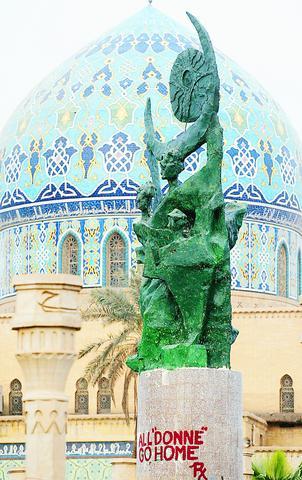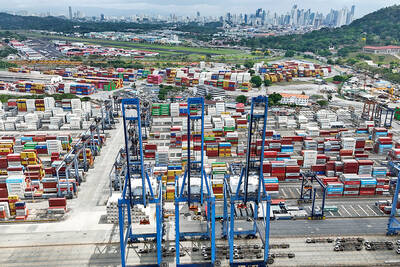The CIA is reviewing its intelligence, British agents are reportedly doubting their own assessments and Saddam Hussein's enemies are being accused of manufacturing evidence as the White House pulls words like "bureaucracy" out of its rhetorical hat to explain why it could have lied to the world rather than drawing appropriate conclusions from the evidence at hand.
Now, senior politicians on both sides of the Atlantic want answers to what is becoming the most asked question since major combat ended in Iraq: Where are the nuclear, biological and chemical weapons the US-led coalition said it went to war to destroy?
US President George W. Bush said this weekend that weapons had already been found. As evidence, though, he pointed to two suspected biological laboratories which both the Pentagon and American weapons hunters have said do not constitute arms.

PHOTO: AP
For a war fought without the backing of the international community, evidence of the weapons Iraq claimed it no longer had would bolster US credibility around the world.
Now that 11 weeks have passed without such proof, international pressure is mounting on Bush and his coalition partners. The Pentagon is sending a new group of weapons hunters to Iraq to expand the search beginning on Monday.
British Prime Minister Tony Blair, who visited Iraq this week, said Saturday there is "no doubt whatever that the evidence of Iraqi weapons of mass destruction will be there. Absolutely."
"I certainly do know some of the stuff that has been already accumulated as the result of interviews, and others which is not yet public -- but what we are going to do is assemble that evidence and present it properly to people," Blair told Sky News television.
Speaking during a visit to the Russian city of St. Petersburg, Blair said there were "literally hundreds, possibly thousands, of potential WMD sites that are still being investigated. We have only just begun that task."
But Clare Short, who quit Blair's Cabinet on May 12 to protest the government's Iraq policy, was quoted as saying she had seen British intelligence reports on Iraq and they did not support the claim.
"The suggestion that there was a risk of chemical and biological weapons being weaponized and threatening us in a short time was spin," Short was quoted as saying by The Sunday Telegraph newspaper. "That didn't come from the security sources."
But even as Blair and Bush express confidence, members of Bush's Cabinet are offering up alternative theories that have drawn deep concerns both at home and abroad.
Defense Secretary Donald H. Rumsfeld speculated this week that the weapons were destroyed on the eve of fighting. His deputy, Paul Wolfowitz, said in an interview with Vanity Fair magazine that weapons of mass destruction became a war banner because it was the only reason everyone in the administration could agree upon when citing why they were going after Saddam.
"The truth is that for reasons that have a lot to do with the US government bureaucracy, we settled on the one issue that everyone could agree on which was weapons of mass destruction as the core reason," Wolfowitz was quoted as saying in a Pentagon transcript of an interview with Vanity Fair.
The comments caused a stir in Europe, where lawmakers from such coalition countries as Britain and Denmark demanded their governments open inquiries into the matter. At home, members of Congress are also questioning the war motives.
And in countries that opposed the war, the comments are being used as fodder to justify those positions.
Germany's Frankfurter Allge-meine Zeitung interpreted Rumsfeld's comments as a sign the United States was losing the credibility battle.
"The charge of deception is inescapable," the paper said.
And the leading French daily Le Monde called the weapons of mass destruction claim "the greatest lie told by statesmen in recent years."
US-led teams, made up of Special Forces, unconventional weapons experts, military intelligence and scientists began visiting suspected sites in the opening days of the war. Since the fighting broke out March 20, most US and British intelligence leads have been exhausted. Teams are now chasing tips from local Iraqis, none of which have panned out so far.
As of Monday, the weapons hunters will begin working for a new Pentagon-led group of some 1,400 people, including US weapons experts who once served as UN weapons inspectors.
The Iraq Survey Group will be led by Keith Dayton, a two-star general. Troops involved in the search hope the ISG will be able to provide the effort with better intelligence and analysis.
Dayton, a top official in the Defense Intelligence Agency, said he remains convinced his team will find weapons of mass destruction in Iraq.
Those assessments were doubted by many members of the UN Security Council, which last fall agreed to send international inspectors back to Iraq to verify the country no longer had the weapons it was prevented from producing after the 1991 Gulf War.
The quality of that intelligence is now being reviewed by the CIA, whose director, George Tenet, released a rare statement Friday defending his agency.
"Our role is to call it like we see it -- to tell policymakers what we know, what we don't know, what we think and what we base it on," Tenet said. "The integrity of our process was maintained throughout and any suggestion to the contrary is simply wrong."
British intelligence is reportedly taking stock of its own assessments as well.
On Thursday, the British Broadcasting Corp. reported that agents were unhappy with a dossier Blair's office released on Iraqi weapons last year -- particularly its claim that Saddam was able to launch such weapons on 45 minutes' notice.
The network quoted an unidentified intelligence source who said intelligence agencies added that charge at the behest of the prime minister's office, but now believe it was wrong.

THE TRAGEDY OF PUNCH: Footage of the seven-month-old Japanese macaque has gone viral online after he was rejected by his mother and formed a bond with a soft toy A baby monkey in Japan has captured hearts around the world after videos of him being bullied by other monkeys and rejected by his mother went viral last week. Punch, a Japanese macaque, was born in July last year at Ichikawa City Zoo. He has drawn international attention after zookeepers gave him a stuffed orangutan toy after he was abandoned by his mother. Without maternal guidance to help him integrate, Punch has turned to the toy for comfort. He has been filmed multiple times being dragged and chased by older Japanese macaques inside the enclosure. Early clips showed him wandering alone with

Australian Prime Minister Anthony Albanese yesterday said he did not take his security for granted, after he was evacuated from his residence for several hours following a bomb threat sent to a Chinese dance group. Albanese was evacuated from his Canberra residence late on Tuesday following the threat, and returned a few hours later after nothing suspicious was found. The bomb scare was among several e-mails threatening Albanese sent to a representative of Shen Yun, a classical Chinese dance troupe banned in China that is due to perform in Australia this month, a spokesperson for the group said in a statement. The e-mail

TENSIONS: The march went ahead without clashes, but arrests were still possible as police investigate suspects behind Nazi salutes, racist slurs and homophobic insults Thousands of people on Saturday marched in southeastern France under heavy security in tribute to a far-right activist whose killing, blamed on the hard left, has put the country on edge. The crowd — many wearing black and some covering their lower faces with masks — marched through the city of Lyon carrying flowers and placards bearing pictures of Quentin Deranque and the words: “justice for Quentin” and “the extreme left kills.” The 23-year-old died from head injuries following clashes between radical left and far-right supporters on the sidelines of a demonstration against a politician from the left-wing France Unbowed

‘OCCUPATION’: Hong Kong said it had lodged ‘stern protests’ with Panama’s consulate, and would ‘staunchly support’ the rights and interests of Hong Kong companies Panamanian President Jose Raul Mulino on Monday ordered the temporary occupation of two ports run by a unit of CK Hutchison Holdings Ltd following the Supreme Court’s ruling against the firm’s concession, escalating a dispute that has become a proxy battle between the US and China in Latin America. Mulino said in a speech that the administration and operation of the two ports on the strategic Panama Canal is to revert to the country’s National Maritime Authority to ensure their uninterrupted, safe and efficient operation. The occupation covers movable equipment at the ports and does not mean a definitive loss of